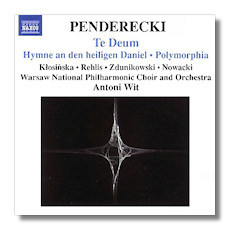
The Internet's Premier Classical Music Source
Related Links
- Penderecki Reviews
- Latest Reviews
- More Reviews
-
By Composer
-
Collections
DVD & Blu-ray
Books
Concert Reviews
Articles/Interviews
Software
Audio
Search Amazon
Recommended Links
Site News
 CD Review
CD Review
Krzysztof Penderecki

Choral Works
- Te Deum 1
- Hymne an den heiligen Daniel 2
- Polymorphia
- Polish Requiem: Chaconne
1 Izabella Kłosińska, soprano
1 Agnieszka Rehlis, mezzo-soprano
1 Adam Zdunikowski, tenor
1 Piotr Nowacki, bass
1,2 Warsaw National Philharmonic Choir
Warsaw National Philharmonic Orchestra/Antoni Wit
Naxos 8.557980 DDD 67:06
Penderecki's Te Deum (1979-80) represents a fascinating mid-point in his transformation from the avant-garde experimenter of the 1960s to the more conservative and almost Neo-Romantic composer that he became in the 1980s. The composer's inspiration was Cardinal Karol Wojtyła's appointment to the papacy, as Pope John Paul II, in 1978. This occasion would suggest joyous music, and the Latin text, a hymn of praise, usually is set to music that is, if not joyous, then at least positive. Penderecki went in a different direction, however, and this Te Deum is ominous, full of doubts and fears, as if the composer could not or did not want to forget the fearful power of the Lord… or the tragic history of Poland. The assured, highly varied choral writing foreshadows his Symphony #7, the so-called "Seven Gates of Jerusalem," although it also looks back at early masterpieces such as the Stabat Mater and the St. Luke Passion. There is striking writing for the vocal soloists as well, particularly for the soprano and the bass. The composer's own recording of this work – now more than a quarter-century old – has stronger soloists, but overall, his recording has a softer grain than Wit's, which ultimately is to be preferred because of the remarkable performance of the Warsaw National Philharmonic Choir.
The Hymne an den heilige Daniel dates from 1997. Regrettably, Naxos' booklet note doesn't explain who "Prince Daniil" was, although the Slavonic texts (and English translations) are provided. (Texts and translations are provided for the Te Deum as well.) As far as I can tell, Prince Daniil was an advocate of the Russian people, "born into the line of Alexander," and an upholder of the Russian Orthodox faith. This 12-minute work for chorus and orchestra begins with a quiet a capella passage of tremendous harmonic richness, and later becomes more dramatic. The Russian Orthodox choral tradition clearly informs this work, but Penderecki's imprint similarly is impossible to miss.
The early, highly abstract Polymorphia (1961) is one of Penderecki's most daring works. Written in the composer's older "sonoristic" style, it explores a variety of unusual – one might say "confrontational" – playing techniques. The strings moan, wail, scream, screech, mutter, chatter, and bay like hounds; apparently Penderecki was inspired by electroencephalogram tracings, and used them as sort of a "melodic" template. It is scored for 48 strings – 24 violins, eight violas, eight cellos, and eight double basses. Although Penderecki probably did not set out to compose "scary music" in this work, Polymorphia's effect on listeners is such that it has been used in the soundtrack to films such as The Amityville Horror. It still sends chills up and down my spine. This is its first recording in many years. Wit and the Warsaw National Philharmonic cut loose, and the detail of Naxos' engineering adds to one's enjoyment of this work… if "enjoyment" is what it is!
The closing Chaconne, also for strings, but unlike Polymorphia in almost every other way, was composed in 2005 in memory of John Paul II, as an addition to the Polish Requiem from the 1980s. Has Penderecki ever composed anything more touching and immediately appealing than this? Naxos' recording of the complete Polish Requiem features many of the same performers as are heard here, although it does not include this new Chaconne. In fact, I think this is its first recording. It's worth the price of the CD.
Copyright © 2008, Raymond Tuttle




















